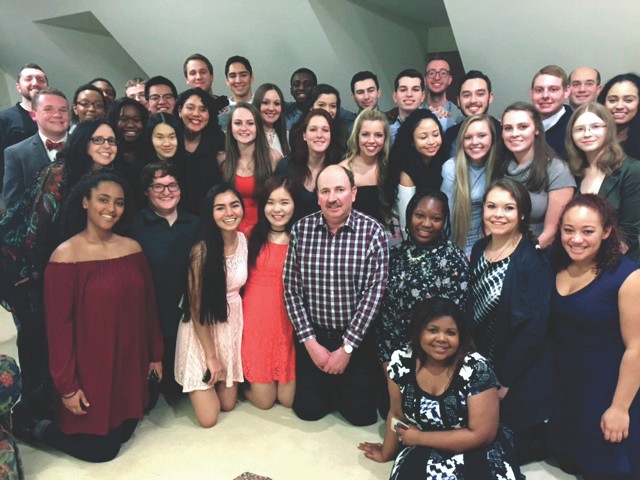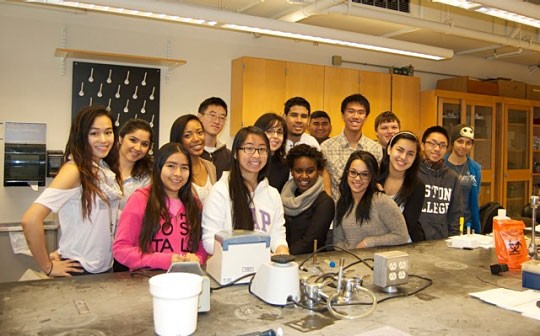An innovative Boston College program designed to support first-generation college students majoring in the life sciences is now in its fifth year and has expanded to include students who are considered underrepresented minorities.
The Gateway Scholars Program is a two-year instructional program for a select group of 30 to 35 life science majors (biology, biochemistry, chemistry). The cohort takes the same courses required of all BC freshman and sophomore science majors, but are typically enrolled in smaller classes and have a for-credit weekly discussion section.

Students and faculty participating in the program gathered for annual Gateway Scholars dinner at the home of Visiting Assistant Professor of Chemistry Neil Wolfman.
The smaller class size allows for better interaction with the instructor and gives students more opportunities to ask questions and seek help if needed.
Associate Professor of Biology Kathy Dunn, who created the Gateway Scholars Program and was its advisor for three years, said the program was designed to combat national trends showing that first-generation college students leave the sciences faster and in larger percentages than other students.
A key component of the program is that beginning freshman year, each Gateway Scholar is assigned a faculty advisor in the Biology or Chemistry departments, with whom they meet regularly.
“All this gives Gateway students early tethering to the department,” explained Dunn. “Making these connections early is one of the intangibles that make the program work.”
The Gateway Scholars Program operates in connection with the Learning to Learn Office and is supported by the Office of the Provost.
“The Gateway Program is a good example of a way departments can collaborate to help first-generation college students,” said Vice Provost for Undergraduate Academic Affairs Akua Sarr.
Assistant Professor of the Practice of Biology Rebecca Dunn and Visiting Assistant Professor of Chemistry Neil Wolfman have been instructors in the program since its inception. They, along with Director of Biology Laboratories Douglas Warner, also serve as faculty advisors.
According to Rebecca Dunn, the cohort model and faculty support are the keys to the success of the Gateway Program. “The students in the cohort all know one another. This removes the intimidation and they are completely uninhibited.”
“It’s a community,” added Wolfman, the 2015 Boston College Phi Beta Kappa Teaching Award winner. Both Wolfman and Rebecca Dunn noted that the cohort’s cohesiveness extends outside the classroom to study groups, video game hangouts and shopping trips.
“They have a close relationship with me and Neil. There’s an extended family feeling,” added Rebecca Dunn, who also lauds the diversity present in the cohort.
“The Gateway Program is a good example of a way departments can collaborate to help first-generation college students.”
Program instructors have found that Gateway Scholars are more likely to come from less well-ranked high schools, and thus have had fewer AP course opportunities or less preparation than their BC peers. The goal of the Gateway Program is to bridge that gap.
“Many of us in the program come from small towns and small high schools,” said senior Harry Cheung, a double biology and psychology major whose parents are immigrants from China and did not attend college or high school. “[Gateway’s] small class sizes allowed us a sense of comfort while taking our first science classes.

Gateway students work with Assistant Professor of the Practice of Biology Rebecca Dunn over semester break to learn lab skills, design experiments, and conduct data analysis.
Program instructors have found that Gateway Scholars are more likely to come from less well-ranked high schools, and thus have had fewer AP course opportunities or less preparation than their BC peers. The goal of the Gateway Program is to bridge that gap.
“Professor Rebecca Dunn’s Molecules & Cells course was the very first class that I had at BC. I can honestly say that the energy [she] puts into her work inspired me to stay in the sciences. She was able to convey how fascinating science truly is and made me fall in love with science.”
Gateway also offers peer mentoring, where freshmen can get guidance from seniors who have gone through the program.
This year, the Gateway Program was opened up to include students who identified as underrepresented minorities. Students who are candidates for the Gateway Program are invited to listen to a presentation during orientation and, if interested, are then encouraged to apply to the program.
The first cohort of Gateway Scholars graduated in 2016. Rundell Douglas ’16, who majored in biology, is now a graduate student in George Washington University’s Milken Institute School of Public Health. Matthew Blake ’16, also a biology major who completed a biostatistics summer program at Harvard, is a research technologist at the University of Washington School of Medicine.
After graduation in May, Cheung is planning to take a gap year to work while also applying to medical school for entry in the fall of 2018.
Wolfman and Rebecca Dunn’s commitment to, and care for, the Gateway Scholars is abundantly evident. Earlier this month, they organized a career panel for the students featuring a medical student, a nurse practitioner and a professional in the pharmaceutical industry, to highlight different career opportunities in the life sciences.
Every year, Wolfman and his wife host the Gateway Scholars at their home in Dover for a homemade dinner. Rebecca Dunn offers a special hands-on program over semester break where Gateway students learn lab skills, design experiments and conduct data analysis. The group also takes outings to the Museum of Fine Arts and other Boston spots.
“I probably try to meet with Professor Wolfman at least once per semester to talk about my academic and career goals,” said senior Melissa Chin, a biochemistry major and medical humanities minor. “He has been unbelievably gracious in offering me advice, writing me recommendations, and serving as a reference during my many application processes. I have been unbelievably privileged to have had him as a professor and mentor.”
“Professor Wolfman’s General Chemistry classes gave me the most important skill I have acquired at BC: the ability to think critically,” said Cheung. “Even though many people dread his class because of how difficult it is, I do not think I would have been successful in the sciences without him. He taught me that, regardless of what you are doing, hard work and conscientious thinking can help you tackle any situation.”
-- Kathleen Sullivan | University Communications



